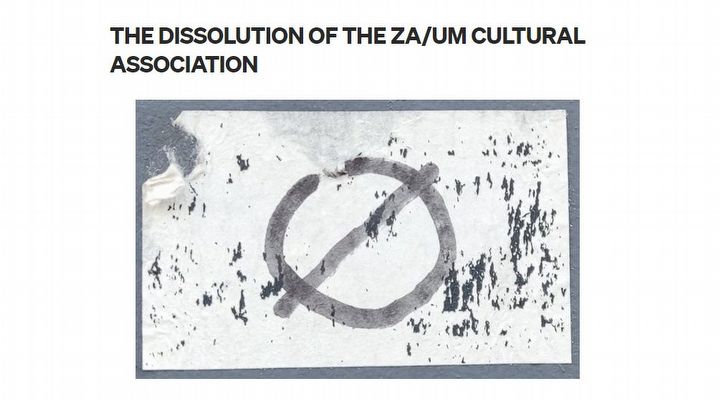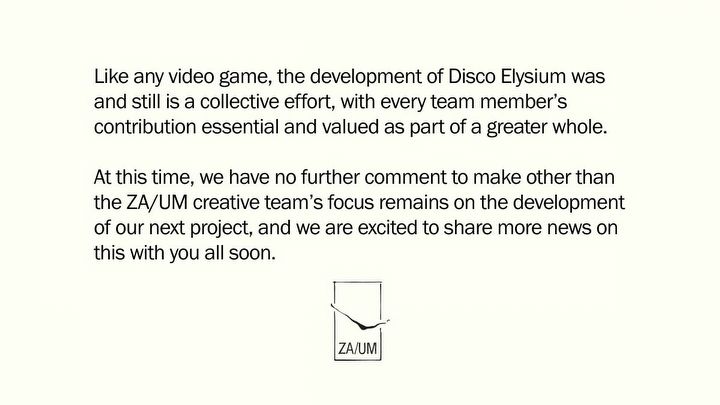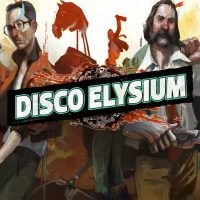„Fans Have the Right to Know” - Disco Elysium Co-Creator Talks ZA/UM Losing With the System
The sad news of ZA/UM Cultural Association's dissolution and the firing of key figures from the studio that gave us Disco Elysium have left many players hurting. We talked the man who delivered it to the public.
47
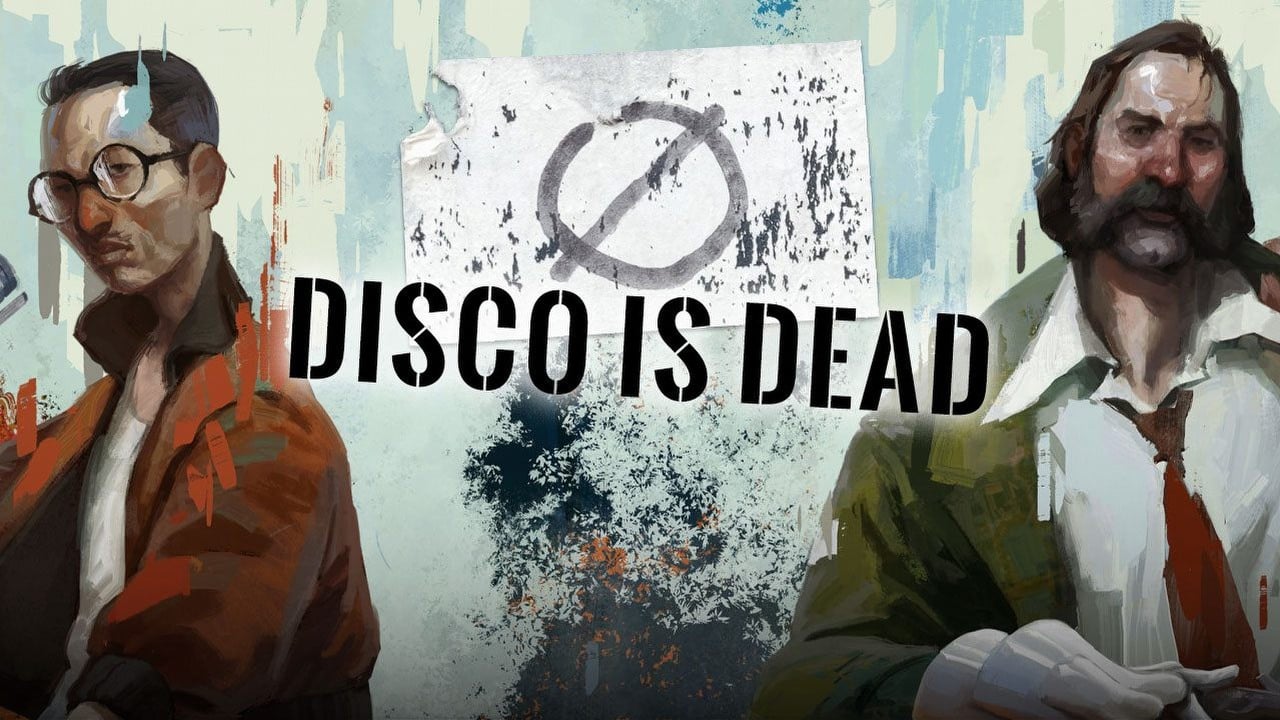
Money makes the world go round – whether we like it or not, Liza Minelli was not spreading false narratives. Naturally, the video game industry is no exception. In fact, it's one of the hottest corners of capitalism, consumerism, and corporatism on our entire sore planet. Since the dawn of days, however, the powers reigning the reality are involuntarily generating anti-systemic forces – fugacious, but aggressive paroxysm initiate revolts, herald uprisings, and deliver elaborate criticism of all the system’s irregularities, including pathologies of the economic, political, or social sort (ask the Parisians about barricades). The artistic collective ZA/UM was an inconspicuous, at least initially, force in gaming. They promised a lot and delivered on these promises, but what remains today are but two things – beautiful memories and a company that sacked its creative progenitors.
On October 1, 2022, the co-founder of the former ZA/UM Cultural Association and editor of Disco Elysium, Martin Luiga, announced the dissolution of said association. Reasons? Loss of values and ethos by ZA/UM studio somewhere along the way. He also recalled that other originators of the Elysium universe (and the cRPG created inside it) – namely, Robert Kurvitz, Helen Hindpere and Alexander Rostov – were pushed out of the studio in late 2021.
The whole incident raised many questions, and not enough answers. Because in addition to the eternal question "Why?" and a few brief conclusions about another victory of business over ideas, fans of Disco Elysium really began to wonder what to make of the future of the series. What caused the rupture? What does it even mean: “ZA/UM has been dissolved,” if the company is still present on the market? Like I said – questions and not enough answers. However, part of the grim truth is already clear. First, I connected a few dots. Second, I contacted Martin Luiga, who kind of caused this whole media storm by announcing the end of ZA/UM. And although he also doesn't have the entire context, the full picture, he is sufficiently acquainted with the atmosphere inside the studio and isn’t hiding his regrets nor biting his tongue.
Martin Luiga

Co-founder of the ZA/UM artistic association, the man, who recently announced its dissolution. He worked in ZA/UM studios until 2021. The editor of Disco Elysium, he also participated in conceptualizing the Elysium universe for years.
Twitter: @martinluiga
In the beginning there was Elysium
For people who are interested in this whole affair, but don't know what Disco Elysium and the studio behind it are, a brief explanation. It's an isometric role-playing game inspired by such timeless classics as Planescape: Torment and Baldur's Gate, but without a combat system. In the game, we develop a character, explore the environment, hold long conversations with NPCs, while all the actions are determined by dice rolls and checks, just like in pen-and-paper RPGs. The whole thing became famous for its surreal style and extremely complex and coherent story and setting, deeply engaged in political and existential problems. The Estonian ZA/UM created the title, a fledgling gamedev studio, which previously functioned semi-formally as said art collective. You're welcome to find out more details yourself here; I have already done some praising in another article.
Luiga also told me about the beginnings of the project:
I am but one of the founders of the ZA/UM collective and the Elysium universe predates it – to my knowledge Robert (Kurvitz, ed.) was developing the predecessor to the Elysium universe already at least in 2002, while ZA/UM collective was formed in 2009.
The idea to make a video game originated with Kaur Kender in 2014 or 2015. He thought the Elysium world – he helped us publish Sacred and Terrible Air – lent itself well for the medium. While others had thought such a thing out of reach for us.
The inception of the world of Elysium happened in the mind of Robert Kurvitz. Besides, he was the project lead for Disco Elysium, which was supposed to be just a video-game introduction to the imagination of the artist and the world he formed together with friends and peers. The phrase "Disco" in the title means "I'm learning," while "Elysium" is treated by Kurvitz as "an embarassing fantasy construct; a messianic, transatlantic, large-enough-to-blot-out-our-entire-reality vessel of conquest."
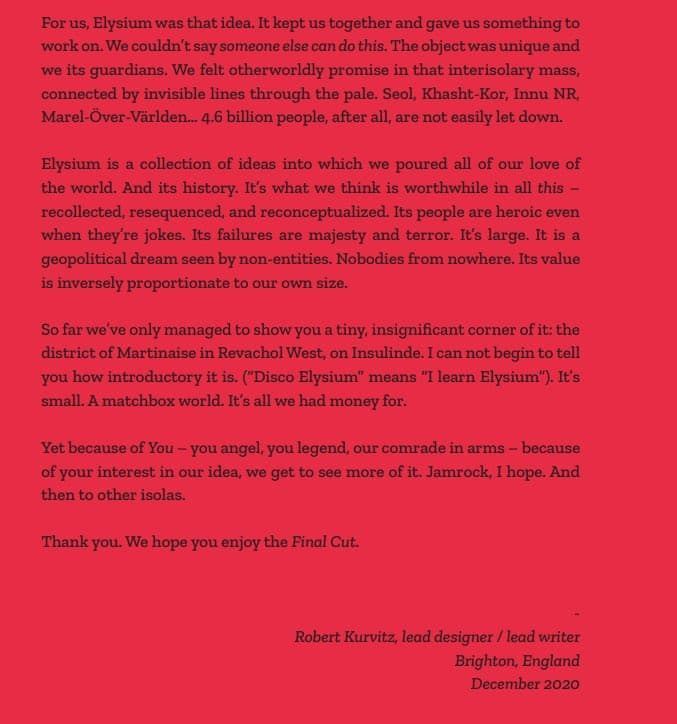
That's a hefty number of complicated words, innit? But that's because they come from Kurvitz (you can find them in the artbook included in the collector's edition of the game) – a left-wing idealist and artist, co-founder of the collective who entered gaming with a bang – heck, he spent at least the last 20 years building his own, original universe, which he shared with us.
He formed a harmonious trio with Hindpere (the main screenwriter of the game) and Alexander Rostov (art designer for DE). Together, they shaped the Elysium world and brainstormed their favorite cultural inspirations, the beloved cRPGs. It was their real, long-term passion-project – some will say it was naive, others will applaud in admiration.
However, this project had to be implemented. And so, the search for funding began. Initially, they were offered a great deal of aid by Kaur Kender – an Estonian writer and entrepreneur with an equally avant-garde approach to art, who took responsibility for all kinds of negotiations and contacts. Luiga also mentions their first source of income:
The initial investor was Margus Linnamäe, a high-profile Estonian bussinesman active primarily in pharmacy, but also in other areas. I would personally think that Mr. Linnamäe has made it a bit of his personal mission that each Estonian community with any weight should owe him something. […] In the initial phase of the development, Kurvitz and Rostov enjoyed considerable artistic and organizational freedom.
From the very beginning, compromises had to be made – to secure financial support from people not necessarily interested in artistic prowess of the project, but rather in planting firm roots in a potentially future-proof and profitable place. Luiga recognizes that this project wouldn't have happened without the investors, but at the same time he seems to appreciate that they also contributed to building internal tensions in the advanced phase of the studio's operations.
So, from the very beginning of ZA/UM's activity as a company that grew out of a collective, one could just state that "business is business," and argue that the creators became dependent on external funding too quickly. This seems to expose a bit of a market paradox, right? The avant-garde idealists had to sign a pact with the devil in order to allow themselves the creative freedom to match their ambitions. They got it, and in the end created a game of which they were proud. But sometimes the harbinger of destruction is... success. And Disco Elysium turned out to be exactly that – undeniably and unexpectedly.
Criticism of capital strengthens capital
Industry awards and astonishing success at The Game Awards are one thing; infecting the world with the Elysium universe is another matter. After the game's release, on October 15, 2019, the developers received a really clear message from people – they not only wanted more; they were sure that more was indeed coming. The game sold well, and ZA/UM quickly spread wings, becoming an inter-industry machine for generating the sweet, old money. Disco Elysium has quickly gained sizable fandom and became a brand in strictly business sense of the word.
The game received an exuberant collector's edition as well as the expanded Final Cut version (which Luiga described as a redundant superstructure of the finished product); an online store with merch like clothes, mugs and ties, and a fairly exclusive fashion atelier that has opened in London, offering beautiful jumpsuits for a few hundred pounds each.
The company has also decentralized its HQ, operating in parallel in Brighton, London, and Porto, while constantly increasing the number of employees. The vacancy that puzzled players the most is a specialist in monetization and sales – this immediately generated, so far unjustified, discussions about micropayments, NFT and other bad ideas for the franchise.
However far these fears are from realizing, one should remember where they come from. Disco Elysium as a game carries a fairly clear anti-capitalist message, and bourgeois inclinations are often ridiculed by the screenwriters. In addition, the whole multi-vector, corporate activity of ZA/UM looks kind of corrupt once you realize that the people who constitute its soul have, let's face it, been kicked out from the office. The point being: it wasn't a voluntary departure, nor one by common accord. Luiga emphasizes:
Martin Luiga: It happened late last year. They were fired on false premises and the entire ordeal has been very traumatizing for both them and people close to them.
Karol Laska: You cannot talk about certain things because the NDA binds you. Yet, you mentioned on Twitter that game journalists should take up this subject and speak loudly about the situation. So why is that? And do you think that the context of the entire ZA/UM split, as well as the company’s structural changes, will become known over time (maybe after a few years) or will some matters remain a secret forever?
Martin Luiga: […] I only worked at the company on the first year, and then a few months in 2021, and nothing overly important happened during that second period. I am unsure if I even had an NDA for my first period of working, I rather did not. Anyhow, I am super worried, but I am still not disclosing all information I have, and there is also information which I don't have, and I am rather sure that we will not have the *full* picture before the final judgment.
I think already the fact that three prominent figures have been fired, while the fanbase would expect them to go on, is vital information, and it hadn't been held a complete secret either. The thing is, I love truth, beauty, and justice.
Karol Laska: How do you feel about the fact that someone is making a game set in your universe, while you don’t have control over it, nor can you participate in that process anymore?
Martin Luiga: It's disheartening – particularly for the ones that were more involved with DE, but also me.
The pain of the sacked developers is understandable. They have lost their opus magnum. Legally, there was no theft involved, but the reality is that the people responsible for conceptualizing, creating, and showing the Elysium universe to the world were denied custody of its future development. This is bitter, unfair event, showing the corruption of a system that the leaders of ZA/UM had to enter if they wanted to practice their art. And if you want to find an unseen benefit, there's one reassuring fact – Kurvitz and the company predicted such a course of events. There are countless quotes in Disco Elysium that we could quote here because they say that anti-systemic actions are eventually inhibited by the system, reentering, and reinforcing it.
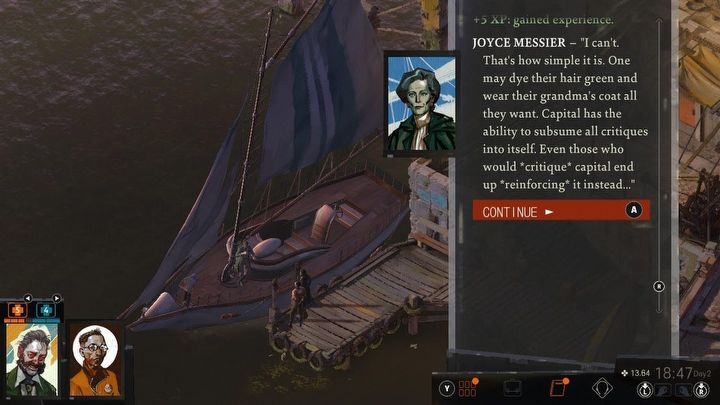
"Capital has the ability to subsume all critique into itself. Even those who would *critique* capital, end up *reinforcing* it instead."Disco Elysium, ZA/UM
Karol Laska: Disco Elysium is a game about, among other things, the demons of capitalism. Now, Joyce's quote (the one popular on the Internet in the moment) about how the criticism of capital eventually becomes its empowerment? Many people find this a perverse, slightly ironic punch line to this whole situation. Would you agree that you’ve anticipated such a finale in the game? Have you not fallen victim to the system you fought against?
Martin Luiga: Well, I even see it as fair, if not entirely intentional. Why should we get to make a successful critique of capital in a world of suffering, and not suffer for it? People suffer all over the industry and all over the world. The question is what we will do about it.
Are there any leads concerning reasons for the dismissal of Kurvitz, Hindpere and Rostov? If you look at the current policy of the company, the left-wing tone of the game, remember about the investors patiently waiting for financial success, and at the same time understand the merciless laws that ensure the functioning of the modern video game industry, then the conclusion, although inferred, can be only one. The trio simply became inconvenient for ZA/UM at one point. They embodied communist and Marxist attitudes, and more than once Kurvitz was criticized by the online community for keeping a bust of Lenin (a violent and ruthless leader) on his desk for traditionalistic reasons.
However, they weren't radicals, but people of strong political outlooks, using existing archetypes to play with convention, experiment with narrative, ponder on existentialism, define human beings as politically engaged in and of themselves, partially unconsciously.
Helen Hindpere spoke loudly about her and Rostov's roots in an interview in Wassup Conversations. They grew up in the "post-Soviet, eclectic Tallinn" – it had to influence their views, lives, and creativity. The brutalist nature of Estonian architecture has become crucial to the way Revachol looks.
In turn, in an interview conducted by the Serbian editor, Nastasya Pisarev, Luiga admitted that the ZA/UM collective was in and of itself a kind of excess and an act of rebellion, because it was formed in a country where being an artist isn't all that easy – it seemingly is more a form of "civil activism" rather than tangible building of culture. It's no accident that the protagonist of Disco Elysium is an alcoholic with undefined political views; Estonia, like many of the countries of the former eastern bloc, is a country plagued by alcoholism, and defined by the transformative thaw that came after the Soviet Union collapsed.
It turns out that the Elysium universe is not only about a vision and ideas, but also a number of outlooks, as well as local history and culture. This may not be an overly explosive mix, but it is problematic for people who want to earn money without fear of lawsuits and the stability of industry arrangements and media cooperation. Calculation. Pragmatism. Rejection of sentimentality. These are the components of capitalism.
Collective effort
Many people will have a hard time getting over the sacking of these developers. However, ZA/UM was entitled to make such a decision. Everyone is entitled to make dumb moves, it seems. The decision to fire the people creating the backbone of your organization is always a risky one. After all, this happened at the end of 2021! Several months have passed since and I do not exactly know what the company's managers have been counting on, nor hoping for. In fact, they were indirectly forced to issue an official statement on social media only after the unforeseen move from Luiga, whose announcement of the dissolution of the ZA/UM Cultural Association was, let's agree, a symbolic, rather than formal move. Because this collective is a set of ideas that has long since turned into a company.
However, the very fact that he immediately mentioned the fate of Kurvitz, Hindpere and Rostov led to a turbulent sequence of events:
- The whole affair fed the curiosity of journalists and players; speculations, questions and emotions ensued.
- Alexander Rostov confirmed on his social media that he no longer worked with Kurvitz and Hindpere at ZA/UM. Hindpere shared this message, thereby also admitting it.
- It took two days for ZA/UM to publish an official statement, a lousy one at that, where it highlighted the COLLECTIVE EFFORT put into work on the next project, while suggesting that the lack of said individuals will not affect the quality of the upcoming game. At the same time, the studio refrained from any discussions, blocking the comments on Twitter. Luiga admitted that this statement "wasn't very good."
Needless to say, ZA/UM's lack of transparency and the shock caused by the news about the collective's breakup quickly turned criticism of the fans into hate. The case got out of hand, appeals to boycott the company's further work started to appear, and even the developers currently employed in the company have spoken, informing that they've received death threats. Developers from other studios are further fueling this crisis, engaging in fratricidal exchange of views. Chaos is born. Luiga responded to the reaction of Internet users:
I support political self-expression. How could I be against it, having engaged in it so much myself? My position was that the fans had a right to know. I do think though that it doesn't make sense to be offensive against the current workers of the company. It is unlikely to change their positions. The managers have a way of making people trust them. Robert (Kurvitz) and others had complete trust in them until it was too late. It pays to remain polite, even if it's hard – and I know that I have not been a very striking example at times.
ZA/UM will probably wait this storm out and then get back to business as usual, hence my claim that Luiga's dissolution of the art collective has merely a symbolic dimension. The co-founder of the now defunct association somewhat calmed the fans by suggesting that the studio's next project might satisfy them anyway. Remember – there are still artists and developers working there. However, if someone is counting on another Disco Elysium, this is where the problems start:
I think ZA/UM Studio in its current form will not be developing the sequel and I am unsure of the number of people that left in the company who also worked on the original Disco.
However, we can still expect some amazing stuff in the future coming from Kurvitz, Hindpere and Rostov, who did not say the last word in gamedev:
I think the three will continue making games, as for myself, I haven't decided the level of my involvement as of yet. Right now, it is mostly the phase of pondering ideas and managing our problems.
The multilayered nature of this whole... let's call it "scandal" may be overwhelming and evoke extreme emotions, but I am writing about this whole affair because for me, it's an example symptomatic of the gaming industry. If this may serve as testament to anything, it would be the fact that artistic vision doesn't permanently belong to its author, especially once it starts wearing a suit. Even if the idea incubated in the artist's head for years, it can still be legally appropriated by a market that doesn't know pity, respect nor morality. Not in the age of money.
And you can be showing this system your middle finger all your life, expose it in brilliant ways. You might even feel safe, think you've figured this world out, stood up to it. But it will eventually come back around and devour you – like the ancient reptilian brain. However, in order not to get carried away by nihilistic accents, Luiga makes one disclaimer: organizations are temporarily, ideas last forever. It's never too late to internalize them.
We also tried to contact Robert Kurvitz, Helen Hindpere and Alexander Rostov. To no avail.
ZA/UM does not provide any answers now either, apart from the press release available on the web.
If you want to support Martin Luiga financially, you will find his work and services under this link.
- „I Think This Industry is Finished.” Disco Elysium Devs Call for Game Developers to Stand Up Against Systemic Greed
- Whole truth about Disco Elysium fate in 18 hours. Watch first part of interview with former ZA/UM devs
- Disco Elysium screenwriter nearly faced bankruptcy, but was saved by help from fans
47

Author: Karol Laska
His adventure with journalism began with a personal blog, the name of which is no longer worth quoting. Then he interpreted Iranian dramas and the Joker, writing for cinematography journal, which, sadly, no longer exists. His writing credentials include a degree in film studies, but his thesis was strictly devoted to video games. He has been writing for Gamepressure since March 2020, first writing a lot about movies, then in the newsroom, and eventually, he became a specialist in everything. He currently edits and writes articles and features. A long-time enthusiast of the most bizarre indie games and arthouse cinema. He idolizes surrealism and postmodernism. He appreciates the power of absurdity. Which is probably why he also tried soccer refereeing for 2 years (with so-so results). He tends to over-philosophize, so watch out.
Latest News
- Butcher's Summit, an impressive free diselpunk FPS, has been released
- Free FPS on Half Life engine gets big update
- On February 3, gaming history could change forever. Red Dead Redemption 2 one step away from a major achievement
- This is not the RPG you expected. Crimson Desert abandons the key elements of the genre, going for original solutions
- Nintendo may unexpectedly beat Sony. State of Play is not to be the only game show awaiting players in February
